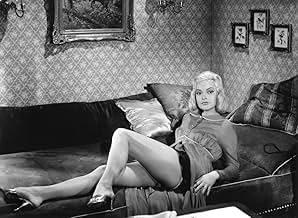Adicionar um enredo no seu idiomaWest Germany in '50s is becoming an economic superpower. In such climate, Rosemarie is just one of many enterpreneurs who wants her piece of new fortune. She uses her charms to bring members... Ler tudoWest Germany in '50s is becoming an economic superpower. In such climate, Rosemarie is just one of many enterpreneurs who wants her piece of new fortune. She uses her charms to bring members of West German industrial elite to her bed. There she finds business secrets and later se... Ler tudoWest Germany in '50s is becoming an economic superpower. In such climate, Rosemarie is just one of many enterpreneurs who wants her piece of new fortune. She uses her charms to bring members of West German industrial elite to her bed. There she finds business secrets and later sells them to French competition. However, when scandal errupts, Rosemarie would find that s... Ler tudo
- Direção
- Roteiristas
- Artistas
- Prêmios
- 6 vitórias e 5 indicações no total
- Oelsen
- (as Tilo v. Berlepsch)
- von Killenschiff
- (as Erik v. Loewis)
- Kleye
- (as Hubert v. Meyerinck)
Avaliações em destaque
introduction to the capitalist society in which big companies and money
dominate. I found the film to be very interesting. I thought that the camera angles were very unique...especially in initial bar scene. I thought that moving the camera around the bar, without cutting, was a very unique way of viewing the room and all of the people in it. I think that the characters were acted out very well. Hartog was completely
stone cold. He rarely ever showed emotion on his face, other than deep
thought. Even in the end, when Rosemarie was attempting to get him to leave
his wife for her, he showed very little emotion. This was one aspect of the film that stood out to me. I particularly enjoyed the two young men who used their musical talents to help Rosemarie and later Rebecca on their way into the "big time." Although these two were essentially gold-digging scumbags, they introduced a fair amount of
humor and unique songs to the film. A perfect example of this humor was when they "tried out" various girls to see which would be the best to take Rosemarie's spot in their trio of sorts. In the middle of the movie, I thought the plot was a little shaky, but in the end it all came together perfectly. All in all, I thoroughly enjoyed the film and thought it portrayed capitalism wonderfully.
Conrad Adenauer lives on as one of Germany's great statesmen. He was responsible for the 'Wirtschaftswunder' (= German for 'the economic miracle', relating to West Germany's speedy recovery from the extensive damages of the lost Second World War). Adenauer rebuilt his country, and led it politically into the Western influence of the USA - making it a member of NATO.
However, in one respect Adenauer failed: he did not deal effectively with the many Nazi-sympathizers in his country. In particular with those in its leading circles. There were just too many of them, and their abilities could not be missed for the re-building of the West German economy.
It may be hard for Americans to appreciate, but 'Das Mädchen Rosemarie' is made special by this issue. The film emphasizes on the bankrupt moral state of mind of these business leaders - their former involvement with Adolf Hitler and his Nazi's is clearly written on their foreheads. In this respect this film's main theme, prostitution, connects very well.
'Das Mädchen Rosemarie' even makes a historical document. I know of no other film dealing in such a clear, sharp and ruthless way with Germany's big post-war moral dilemma. A dilemma vanished by now, for the vast majority of these Hitler-infected leaders have died.
There was secrets about the factory and a conflict between the French man and the English that was never made clear. This made the movie a bit hard to enjoy, because we never get to know what is actually happening. And then there is Rosemarie in the middle of it all, and by leaving out all the details it allows the movie to focus on her story, after all thats what this movie is about. Overall, the camera angles and irony made this movie enjoyable to me.
For example, the small apartment where Rosemarie lived at the beginning of the film was not explained at all during the film. Even the men who lived in the apartment weren't explained in effect or purpose. The story also switched from being somewhat comical, to stark and realistic, to unrealistic at the end. In short, this is a well-done movie that I didn't like.
The film is a cynical comment on the German economic miracle after the Second World War, in the film referred to as "das Wirtschafts-wunderland". The self pronounced heroes of this miracle, the capitalists, are less a role model than they pretend to be.
Two petty criminals, with whom Rosemarie formed a vaudeville group before her "career", comment on the plot in the form of cynical songs. The film assumes thereby a Brechtonion character, sort of a "Drei Million Grochen Oper".
Rolf Thiele was a German director active from 1951 to 1977. His films are mostly sex comedies and mediocre at best. "Das Mädchen Rosemarie" is one of the best, although still not a top movie. In 1976 he made a (far worse) sequel about the daughter of Rosemarie with "Rosemaries Tochter".
Você sabia?
- ConexõesReferenced in Rosemaries Tochter (1976)
Principais escolhas
Detalhes
- Tempo de duração1 hora 45 minutos
- Cor
- Mixagem de som
- Proporção
- 1.33 : 1
Contribua para esta página
































